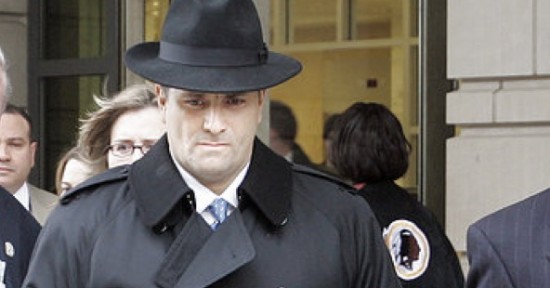Alex Gibney is becoming our nation’s most important documentarian, trumping even the mighty Michael Moore and his ego-indulging antics, by remaining a steadfast narrator in revealing some of our country’s most shocking scandals. Among his previous films, he’s exposed America’s biggest financial disaster in Enron: The Smartest Guys in the Room and taken a trip to the dark side of the Afghan war in the Academy Award® winning Taxi to the Dark Side.
He continues to shock and provoke with his new film Casino Jack and the United States of Money, a portrait of super lobbyist Jack Abramoff who along with some charming con men decide to rock the foundation of our government by buying a piece of it and selling it to the highest bidder. In traditional Gibney style, he exposes Jack’s tale like a page out of Hunter S. Thompson’s journal, diving into a gonzo world of Indian casinos, hookers in Saipan and a mobster style hit in Miami. It all adds up to revealing the mystery behind one of the greatest American heists in the history of our country while leaving you both infuriated and entertained.
Between 2004 and 2005 was when Jack Abramoff’s name suddenly popped into every headline in mainstream media, people wondered who is this guy? Turned out to be an influential Washington lobbyist under investigation for involvement with Indian casinos and a fleet of casino boats. As the story unfolded in the public eye, it became clear that Abramoff was at the center of something much larger, a massive influence peddling scandal that threatened many officials in Congress. But as the headlines subsided and Abramoff was sentenced, his story seemed to fade into memory without ever being clarified. Perfect timing for Gibney to jump in the editing room and literally rattle the cage where Jack is currently serving the remainder of his sentence.
The documentary uses clips from various classic Hollywood films, most notably Mr. Smith Goes to Washington to showcase the former ideals of the past. This is contrasted by the current lack of trust in the relationship our country has fostered between its citizen. Similarly, the graphic motif and style throughout the film hinges on casinos and super imposing faces over dollar bills. The main target is of course greed as it consumes Jack’s ambition first as Hollywood producer than as he rises to be the most sought-after power merchant in the US congress. Gibney uses Abramoff sordid tale as a parallel to what’s happening in our society and government, which is that our obsession with greed and power is getting out of hand.
Casino Jack and the United States of Money is another prime example of how truly messed up the systems in Washington really are. Gibney is able to penetrate into a complex story with details and nuances that are both revelatory and inflammatory. His certain pizazz for throwing zingers at the players in his films, often using their own words to highlight contradictions in their own stories, is used to rouse pure frustration from the audience. At the end of the film, the credits roll across a scornfully ironic image of Tom Delay in Dancing with the Stars, gleefully dancing without a care in the world. It’s an image Gibney wants seared in your brain as a stern reminder that the system doesn’t always work the way it’s supposed to and the big money interests that Abramoff used to benefit his own personal gain still threaten to abuse our democracy.
8 out of 10
What do you think of Casino Jack and The United States of Money?



